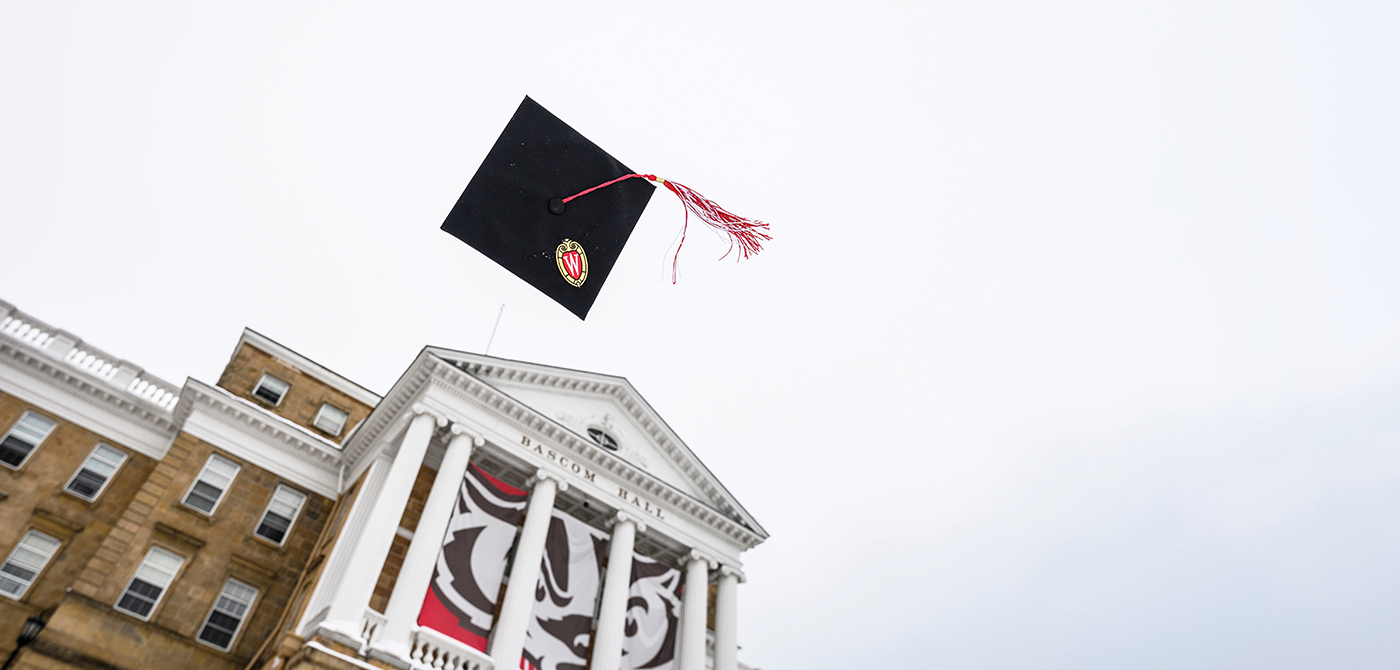
A Gateway to Higher Education
Bucky’s Tuition Promise has transformed student lives — and campus itself.
Four years ago, UW–Madison announced a free-tuition initiative so straightforward that it required just two things for students to qualify: live in Wisconsin and come from a household in the state’s lower half for income. No small print. No strings attached.
“The beauty was in its simplicity,” says Chancellor Rebecca Blank, who greenlit the idea. “Financial aid can be confusing to prospective students. We stripped away the complexity.”
The initiative, known as Bucky’s Tuition Promise, guarantees four years of tuition and segregated fees for any incoming freshman who is a Wisconsin resident and whose family’s annual household adjusted gross income is $60,000 or less. (The figure was $56,000 the first year, the state’s median household income at the time.) Transfer students from Wisconsin can qualify for up to two years of funding.
Already, the program has created an affordable gateway to higher education for thousands of families.
“We know that some high-achieving students from lower- to moderate-income Wisconsin families might not even apply to UW–Madison because they assume they can’t afford it,” says Derek Kindle, vice provost for enrollment management. “Bucky’s Tuition Promise is our pledge to these students that if they do the hard work to get admitted, we’ll find the money.”
The initiative is funded through private gifts and other institutional resources. No taxpayer dollars are used.
Bucky’s Tuition Promise is offered automatically based on a student’s financial aid application. There’s no separate form — another way UW–Madison streamlined the process. And once a student qualifies for Bucky’s Tuition Promise, the promise is good for all four years, even if a family’s financial situation changes.
It’s clear the initiative is transforming individual lives. It’s also designed to transform the student body by making it more economically diverse.
“It’s important to so many of us here that higher education and UW–Madison be engines of upward mobility,” says Nicholas Hillman, an education professor who helped design Bucky’s Tuition Promise and directs the UW’s Student Success Through Applied Research (SSTAR) Lab. “This is one way to act in accordance with our values.”
Elise Marifian PhDx’23, a doctoral candidate in economics and a SSTAR Lab research affiliate, is researching the initiative’s impact. Early results are promising. Marifian found that in the first year of the program, being eligible for Bucky’s Tuition Promise increased the probability that a student from Wisconsin would accept an enrollment offer from UW–Madison by seven percentage points.
“Bucky’s Tuition Promise is one of the most powerful ways we’re ensuring that an education at the state’s flagship university is accessible and affordable for our Wisconsin families,” Blank says.
There are now almost 3,500 students on campus benefiting from Bucky’s Tuition Promise. The first full class of recipients will graduate this spring. Here are some of the ways the program has made their dreams come true.
“It Was Just So Unexpected”
Among family and friends, Parker Vande Hey x’22 is known as the frugal one. Okay, the cheap one.
“Most of my clothes are from thrift stores,” he says. “Goodwill is my favorite, especially when you can buy them out of a bin by the pound.”
Vande Hey grew up on a dairy farm outside of Wrightstown, south of Green Bay, but didn’t want to go into the family business. He worked throughout high school — coffee shop, golf course, pizza restaurant — saving $12,000 by graduation.
“That’s a big chunk of money for a high school kid,” says Vande Hey, the first in his family to attend college, “but it’s not going to get you very far when it comes to tuition.”
When he learned he’d been awarded full tuition for four years, he was shocked. “To have a public university offer you that much money — it was just so unexpected.”
Through internships and part-time jobs, Vande Hey has earned enough money to cover his other college expenses. “I don’t have a lot of spending money, but I’ll be graduating without debt, and I’m so fortunate to be able to say that.”
He’ll complete a bachelor’s degree in marketing this spring.
“Bucky’s Tuition Promise helped me more than I could ever have imagined,” he says. “It made it much easier to focus on studying, which is why we’re here in the first place.”
“We Didn’t Have a Safety Net”
When triplets Eden ’21, Naomi x’23, and Joel x’22 Foster turned 22 in October, they celebrated together — one big party, three sets of college friends.
“It was so fun to bring so many people together,” Joel says. “We wouldn’t be able to do that if we all went to different universities.”
The Madison triplets didn’t set out to attend the same college, but they all landed at UW–Madison because of Bucky’s Tuition Promise and a fondness for the university sparked years ago by a “College for Kids” event on campus.
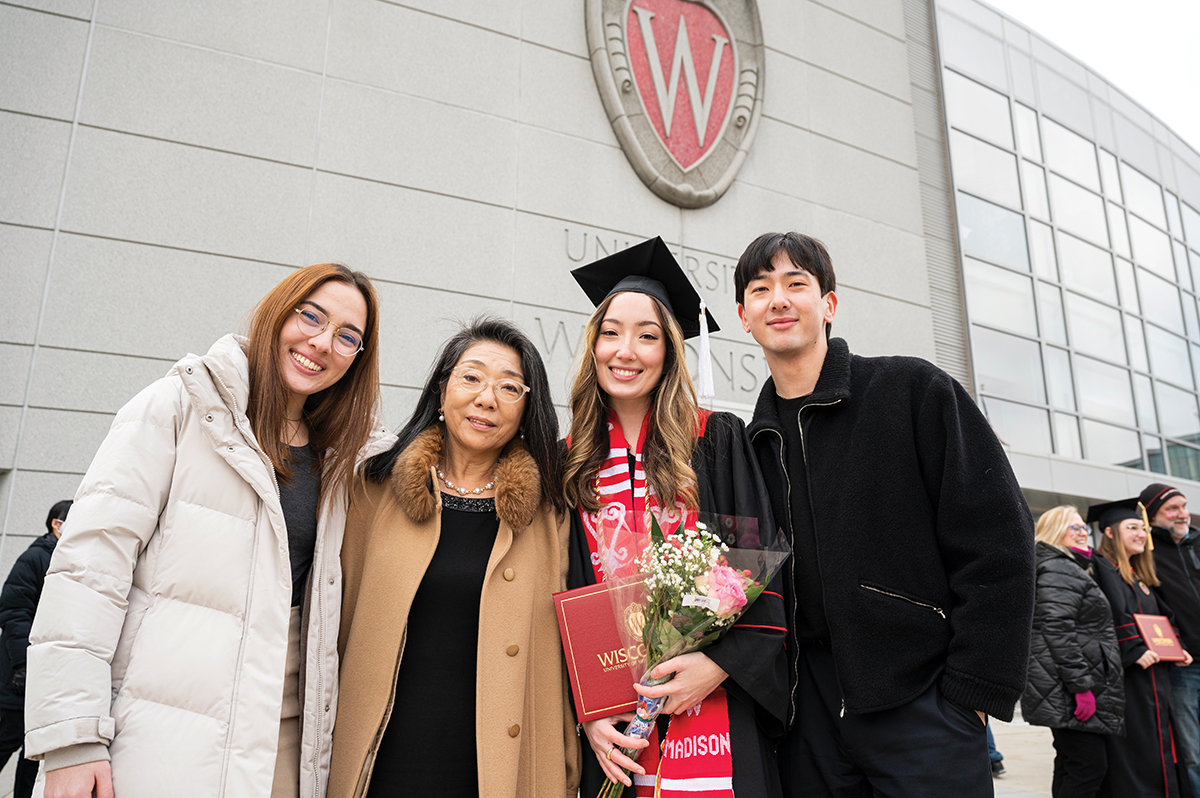
The Foster triplets didn’t set out to attend the same college, but they all landed at UW–Madison because of Bucky’s Tuition Promise. Left-to-right: Naomi, mother Kiyoko, Eden, and Joel.
“It’s not like we couldn’t be apart,” Naomi says. “But it’s definitely been a bonus to be together.”
The siblings describe a typical childhood that suddenly changed at age eight when their father died.
“We were the normal, comfortable, middle-class family until our dad passed,” says Eden, a triple-major in political science, philosophy, and international studies. “Then money became very tight.”
“It put us in a difficult situation — a single, immigrant parent raising triplets,” says Naomi, who is studying dietetics. “Anyone looking at that would say, ‘How did she do that?’ ”
To help their mom, the three grew up fast. They earned their own money and managed their own finances. They studied hard at Memorial High School in Madison — all made the honor roll.
“Since we didn’t have a safety net, it made going to college even more imperative so that we could secure our futures,” says Joel, a double-major in computer sciences and Japanese.
They’ve flourished on campus. Eden earned a scholarship to study abroad in Botswana. Joel serves on the board of the Japanese Student Association. Naomi performs with the a cappella group Tangled Up in Blue.
Soon, they all will be graduates. Three caps, three gowns, three diplomas. Many more parties.
“A World I Didn’t Know Existed”
Tikiri Bandara x’22 often hears fellow students say they chose UW–Madison because of how beautiful the campus looked on the day they toured it.
“That’s fine — it is a beautiful campus,” says Bandara, of Platteville, a city in southwestern Wisconsin. “But for me, it literally came down to a financial aid offer I could not refuse.”
Bandara says he received acceptance letters from several universities, but none could compete with Bucky’s Tuition Promise.
“It’s the sole reason I’m here,” he says. His parents divorced when he was a toddler, and beginning at age 13, he was raised by his father, who immigrated to the U.S. from Sri Lanka.
Once on campus, Bandara realized his pragmatic choice brought with it opportunities he didn’t foresee and would not have found elsewhere. At a conference his freshman year for students considering a medical career, he listened as a doctor with UW Med Flight described transporting a young person who had been trampled by cows.
“A lightbulb went on — medicine and aviation,” Bandara says. “I realized that the lifesaving work UW Med Flight does all over the state really embodies the Wisconsin Idea. I wanted to be part of it.”
He took a class for emergency medical technicians the spring semester of his freshman year and began volunteering that summer with Lancaster Emergency Medical Services near Platteville. As a sophomore, he was hired by UW Med Flight for a part-time job at its operations center, helping to coordinate medical transports.
Bandara continues to work there up to 24 hours a week and also volunteers as an emergency medical technician in Mount Horeb, a village near Madison. A neurobiology major, he anticipates a career in the medical field.
“Bucky’s Tuition Promise is about so much more than just the bottom line,” he says. “It brought me to UW–Madison and opened my eyes to a world I didn’t know existed.”
“This Can’t Be Real”
Alaina Houghton-Chamberlain x’22 remembers the exact moment she got the email telling her she’d receive Bucky’s Tuition Promise. She’d gone to school early that day — at DeForest High School, near Madison — to prepare for an Advanced Placement calculus test. Sitting in the auditorium, she took a break from her studies and scanned her inbox.
“I saw it and thought, ‘This can’t be real.’ It seemed like a fake thing.”
She Googled it. It was real.
“I cried. Then I called my mom and she cried. And then we cried together,” says Houghton-Chamberlain. “For the first time in my college application process, my future at UW–Madison was finally in sight.”
She’d had her doubts. A first-generation college student from modest means, she had fretted over whether she could afford a degree or was even college material. UW–Madison turned out to be a wonderful choice, introducing her to animal research, now her passion.
Surrounded by pets as a child — dogs, guinea pigs, hamsters, snakes — she jumped at the chance to work weekends feeding and watering mice at a campus research center. That led to work in the lab of Professor Joan Jorgensen ’88, DVM’93, where Houghton-Chamberlain is leading the data collection on a study of how a specific gene affects communication between cells in the ovaries of mice.
“I always knew I loved animals, but I didn’t know whether I could turn that interest into an actual career,” says Houghton-Chamberlain, who is double-majoring in biology and philosophy and hopes to attend veterinary school. “The UW was where my interest in animal research was realized.” •
Doug Erickson writes for University Communications.
Published in the Spring 2022 issue
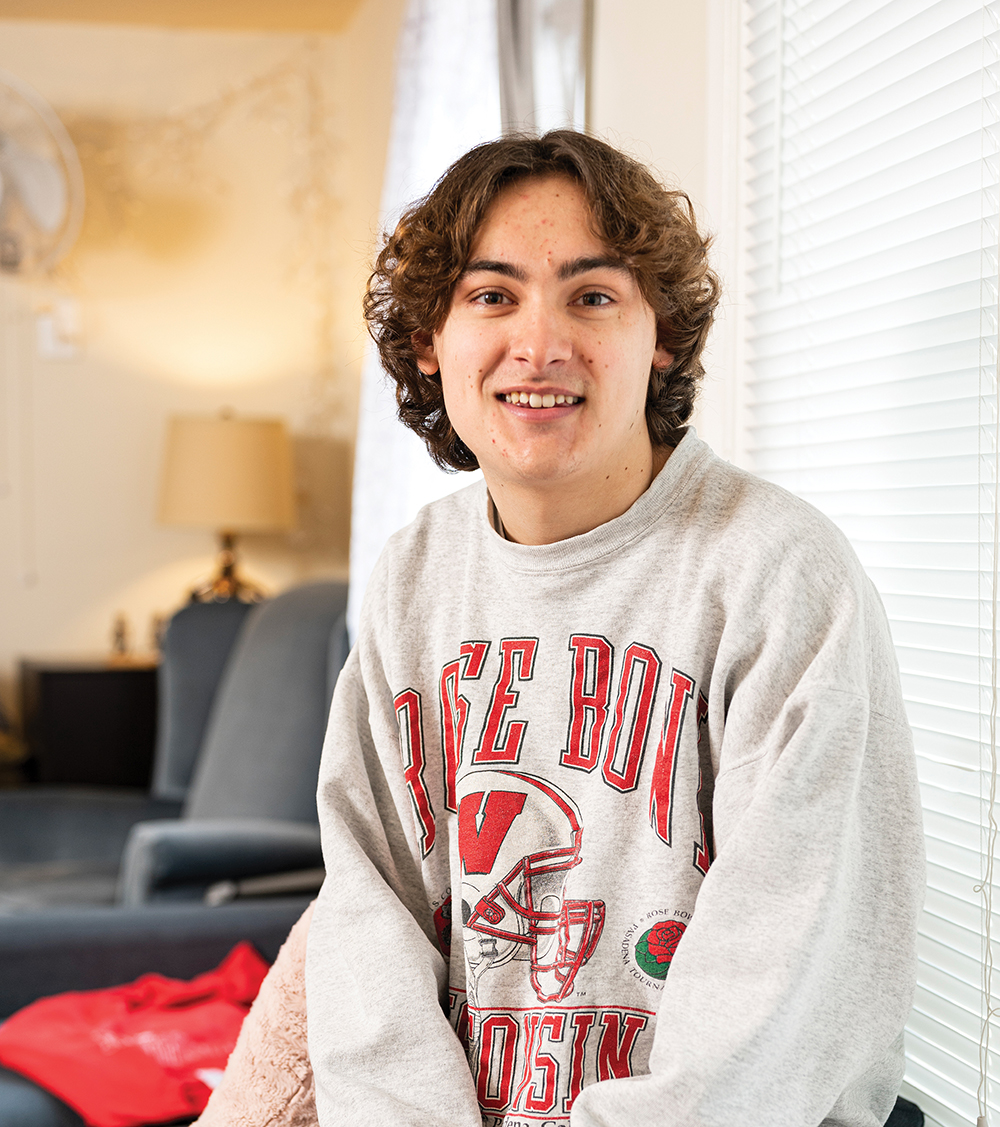
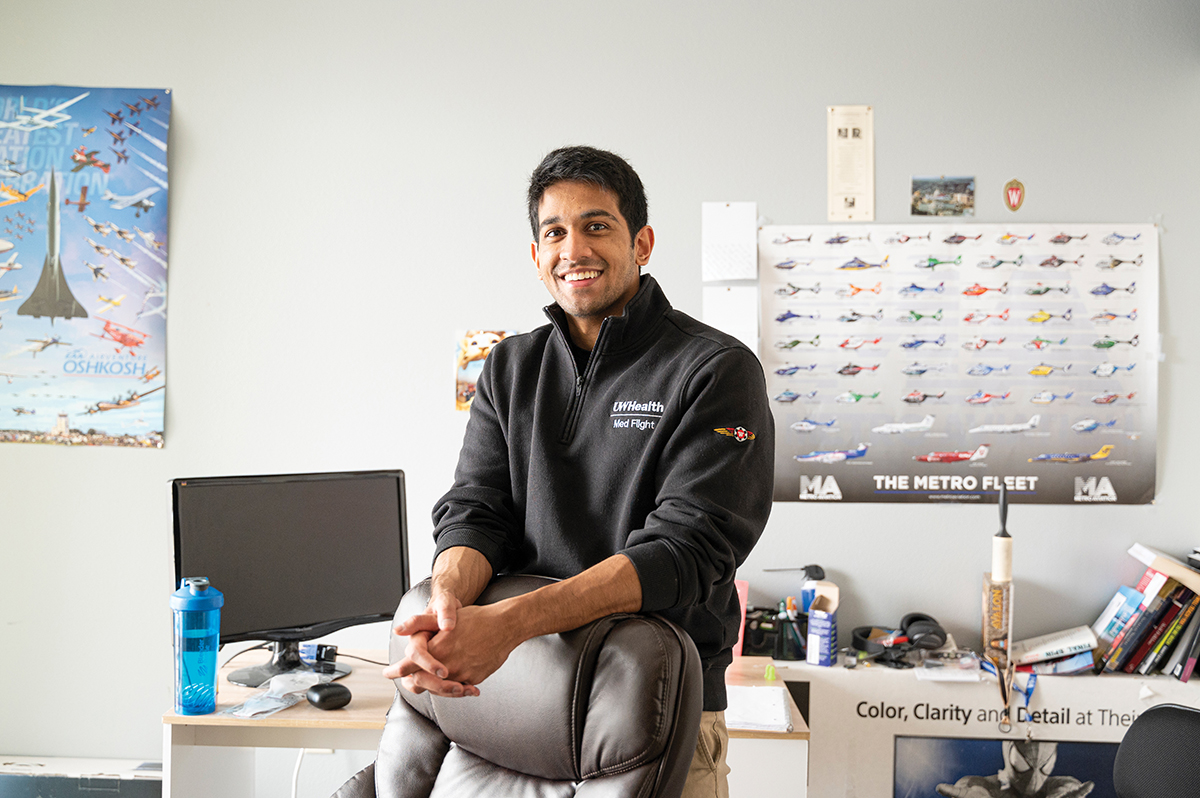
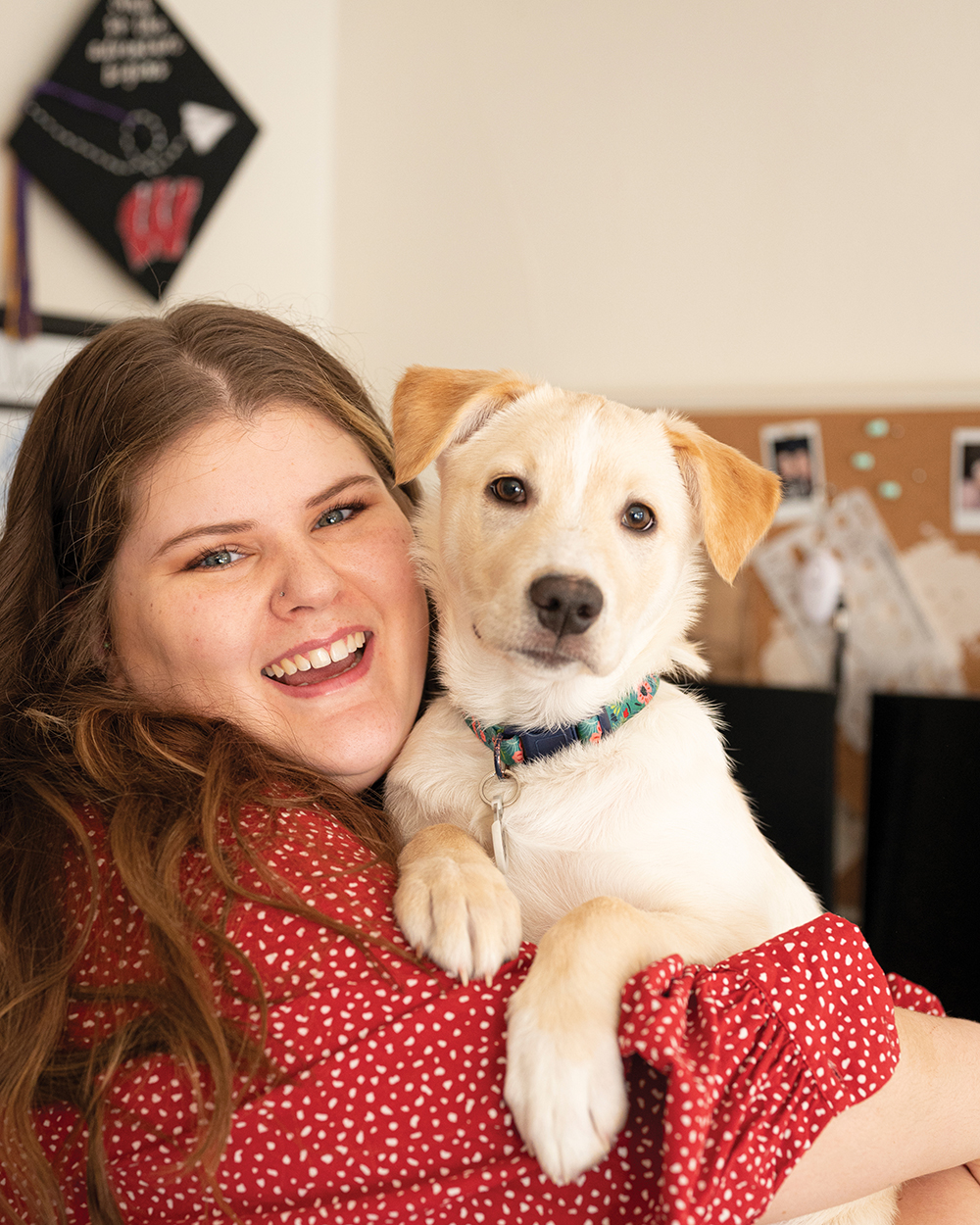

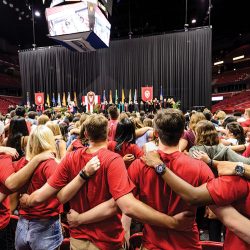
Comments
Steve Houghton March 1, 2022
Great Job Alaina. Proud of you and everything you stand for. You have a great future ahead of you.
Judy H Jorgensen March 3, 2022
This is fabulous! We will all miss Becky and are so glad there are lots of people on campus willing to help these gifted, but struggling students. The future looks great for UW graduates!
C S May 3, 2022
This is an amazing offer. It has helped our family to send 2 incredible students to UW Madison. We will be forever grateful and will continue to give back!
Karen Robert May 3, 2022
What a great program, and it’s great to see how well many [students] flourished and that many took majors that will benefit humanity. Congratulations to all the students graduating this year.
Karen Robert May 3, 2022
What a great program, and it’s great to see how well [the students] flourished and that many took majors that will benefit humanity. Congratulations to all the students graduating this year.
Helaine katz Ratskoff class of 1983 December May 7, 2022
This is so wonderful. Congratulations to all of these students. May your lives bring you each joy success and happiness.
Sue M. June 7, 2022
Congratulations to all of these graduates! Once a Badger, always a Badger! Class of 1976 here.